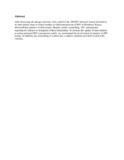| dc.contributor.author | Gaillard, P | |
| dc.contributor.author | Melis, R, | |
| dc.contributor.author | Mwanyumba, F | |
| dc.contributor.author | Claeys, P | |
| dc.contributor.author | Muigai, E | |
| dc.contributor.author | Mandaliya, K | |
| dc.contributor.author | Bwayo, J | |
| dc.contributor.author | Temmerman, M | |
| dc.date.accessioned | 2013-06-26T14:55:45Z | |
| dc.date.available | 2013-06-26T14:55:45Z | |
| dc.date.issued | 2002 | |
| dc.identifier.citation | Gaillard P, Melis R, Mwanyumba F, Claeys P, Muigai E, Mandaliya K, Bwayo J, Temmerman M.,Vulnerability of women in an African setting: lessons for mother-to-child HIV transmission prevention programmes.,AIDS. 2002 Apr 12;16(6):937-9. | en |
| dc.identifier.uri | http://www.ncbi.nlm.nih.gov/pubmed/11919501 | |
| dc.identifier.uri | http://erepository.uonbi.ac.ke:8080/xmlui/handle/123456789/40691 | |
| dc.description.abstract | After discussing advantages and risks, only a third of the 290 HIV-infected women included in an intervention study to reduce mother-to-child transmission of HIV in Mombasa, Kenya, informed their partners of their results. Despite careful counselling, 10% subsequently experienced violence or disruption of their relationship. To increase the uptake of interventions to reduce perinatal HIV transmission safely, we recommend the involvement of partners in HIV testing. In addition, the counselling of women has to address methods and skills to deal with violence. | en |
| dc.language.iso | en | en |
| dc.publisher | University of Nairobi, | en |
| dc.title | Vulnerability of women in an African setting: lessons for mother-to-child HIV transmission prevention programmes. | en |
| dc.type | Article | en |
| local.publisher | College of Health Sciences, | en |

